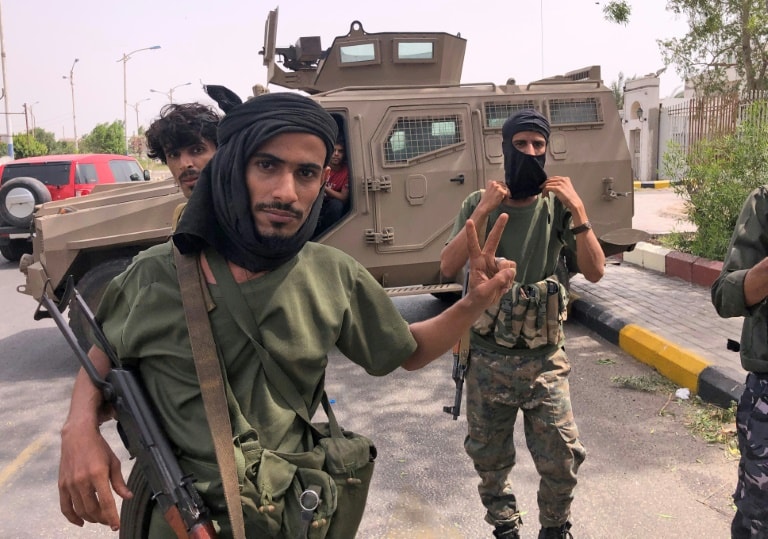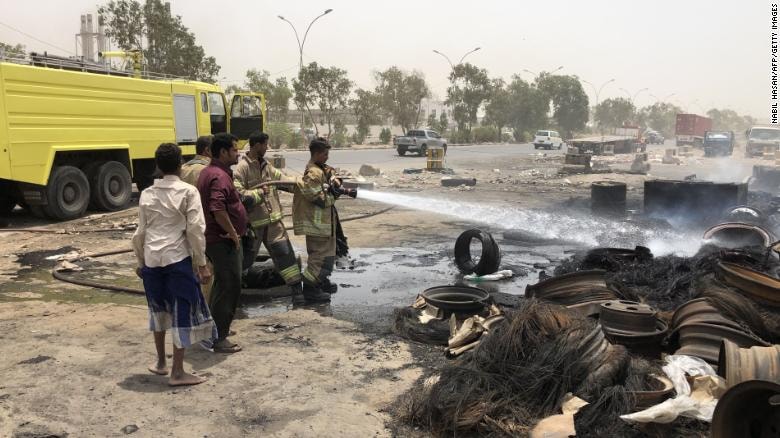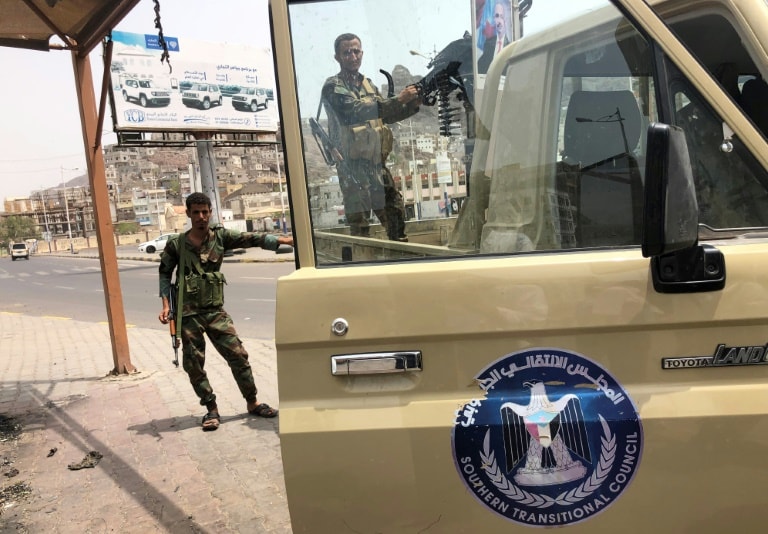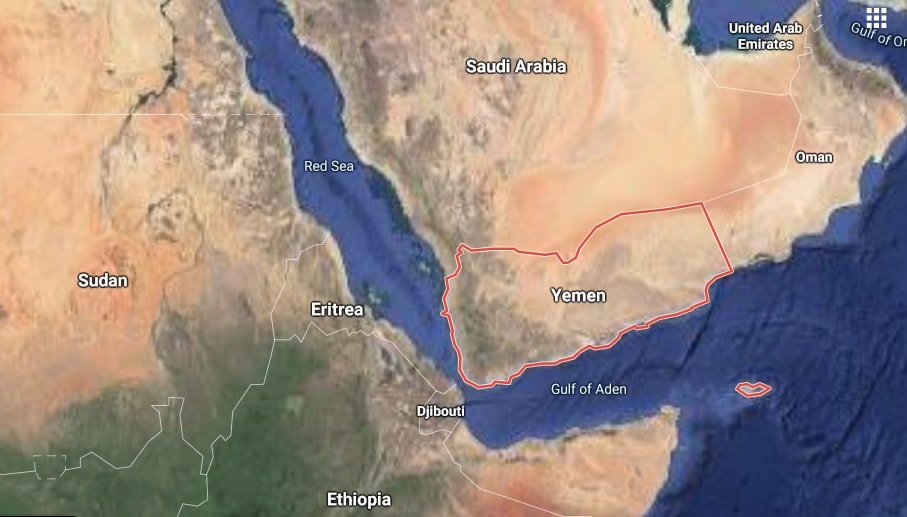Yemen's Civil War: When allies point guns at each other
(Baonghean) - Both sides "fighting" this time in Yemen are members of the coalition against the Iran-backed Houthi rebels in the North, but each side is backed by a member country of that coalition.
A week ago, fighting broke out in Aden, the coastal city of Yemen that is the temporary seat of the internationally recognized government. But unlike what has happened so often in the Middle Eastern country’s four-year bloody civil war, this time the two fronts were not a Saudi-led coalition and Iran-backed rebels.
Instead, factions within the alliance turned their weapons on each other, killing dozens and threatening the very survival of the alliance between Saudi Arabia and the UAE.
 |
| Separatists in southern Yemen are backed by the UAE. Photo: AFP |
"Coup d'etat" in Aden
According to CNN, by Sunday, the Southern Transitional Council (STC) - a separatist movement in Yemen backed by the United Arab Emirates (UAE) - had taken control of the strategic area of Aden, after several days of fighting with forces supporting the internationally recognized government.
In just four of the many days of fighting between southern separatists and President Hadi's forces, 40 people have been killed and 260 others injured.
As the separatists gained the upper hand, the Saudi-led coalition intervened to protect the local government, storming an empty plot of land in the presidential palace after it fell under separatist control.
The southern Yemeni separatists saw the airstrike as a warning and later left the presidential palace, but maintained control in Aden.
 |
| Firefighters extinguish a blaze after clashes between pro-government forces and separatists in Aden on August 11. Photo: Getty |
Yemeni Interior Minister Ahmed al-Maysary called the events of the past few days a “successful coup” as he admitted defeat in a video, before joining the remaining members of Mr Hadi’s government, who are currently living in exile in the Saudi capital Riyadh.
According to reporters, the situation in the city of Aden has returned to relative calm, after days of street battles that left civilians "trapped" in their homes, not daring to go out.
Why?
The war between southern separatists and the government in Aden is a testament to the complexity of the conflict in Yemen, to the point where it can even be called a “civil war within a civil war”.
It should be noted that both sides “fighting” this time are members of the coalition against the Iran-backed Houthi rebels in the North, but each side is backed by a member country of that coalition.
 |
| STC said it was ready for dialogue after days of fighting with pro-government forces in Aden. Photo: AFP |
The STC has the support of the UAE, while Hadi's UN-recognized government is propped up by Saudi Arabia, and the two sides have a history of fighting over control of Aden.
According to some experts, the STC has long sought independence for southern Yemen, but had to put this aspiration on hold when Houthi rebels took control of the capital Sanaa in 2014.
The STC then joined the Saudi-led coalition, agreeing to operate under the Hadi government. They have been instrumental in many of the coalition’s victories over the past four years, but that does not mean they are included in the government or present at peace talks.
The STC has also been critical of corruption in the local government and the failures of the military. Recently, the STC accused Hadi’s presidential palace guards of “colluding” with the Houthis in an attack that resulted in the death of one of their military leaders.
Meanwhile, the government claimed to be defending state institutions against thousands of protesters. Fighting soon spilled onto the streets of Aden, ignoring calls for calm from regional leaders.
Proxy war between UAE and Saudi Arabia?
Western media analysis “dissected” the moment President Hadi’s Interior Minister bitterly “congratulated” the UAE on its victory while admitting defeat, thereby identifying the possibility that recent developments were a proxy war between the UAE and Saudi Arabia.
To be frank, the two sides also have long-standing disagreements on the political front. The UAE is at odds with Saudi Arabia over the fact that Mr. Hadi's government includes members from the Islah party - which is believed to have links to the Muslim Brotherhood group, which the UAE considers a terrorist group.
Riyadh - the capital of Saudi Arabia - is the de facto center of Yemen's government, and Hadi and his cabinet ministers spend most of their time in Saudi Arabia.
Meanwhile, the UAE has empowered the separatists, relying on them and others to win battles on the ground.
On August 12, the leaders of the UAE and Saudi Arabia met to discuss Yemen, but perhaps the images of lavish receptions attempted to mask the impact of the risk of “cooking skin” in their alliance.
So where does the war in Yemen end? While it is widely believed that the end of the long-running war in the West Asian country will come through military force or peace talks, the conflict in Aden has now made the story much more complicated.
 |
| Civil war has been going on for the past four years in the Middle Eastern country of Yemen. Photo: googlemaps |
A fractured alliance is not enough to tip the existing balance in anyone's favor, and it may even mean that the war will continue, and involve more parties.
Hadi’s legitimacy and credibility will suffer if he fails to speak for all he has promised. And on the humanitarian front, the loss of access to a vital port like Aden complicates the work of aid missions in the world’s worst humanitarian crisis.
However, a few bright spots can be seen from this incident. This can be seen as a wake-up call for all parties, making them understand that any sustainable solution needs to address the bottlenecks of all parties.
Last December's Stockholm agreement on Yemen focused on short-term goals, but the talks did not address the immediate concerns or future aspirations of the southern separatists.
This is something to be reconsidered once the situation in Aden calms down and the parties agree to engage in dialogue under the auspices of Saudi Arabia.

